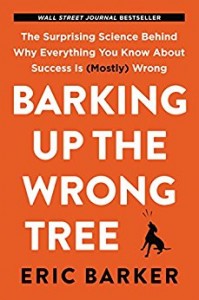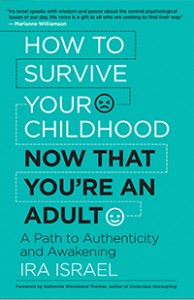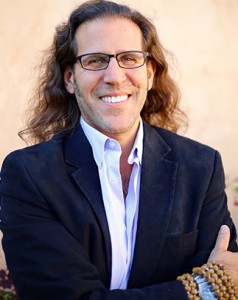Guest post by Eric Barker.
Do your friends sometimes disappoint you? Ever feel like there is something missing in your relationships? You’re not alone.
Tom Rath and the Gallup organization discovered something interesting: the vast majority of the time, no one pal offers you everything you need from your relationships.
Some of your friends are great listeners… but they’re not always there when you need them. Others are intensely loyal… but just not that great at helping you out of a jam. And so on.
We get different things from different friends. And sometimes even with a sizable group you’re still not getting all the things you want in order to feel truly supported in life. Kinda like how to be healthy you need the four different food groups — you can’t just eat cookies for every meal.
“Friendship” is a pretty vague word. You generally don’t even know everything you want from your relationships to feel whole — you just know something’s missing. There’s a gap.
So Rath and Gallup got to work. They surveyed over a thousand people to find out what the types of “vital friends” were — someone who if they vanished, your life satisfaction would noticeably decrease.
What did these types of friends offer? How do they round out your life? What are those things we all want from a group of friends to feel truly fulfilled?
Rath breaks down the results of their research in Vital Friends: The People You Can’t Afford to Live Without.
It turns out there are 8 types of “vital friends.” Many of us don’t have all of them in our squad, and that’s why we often feel disappointed or like we’re not getting everything we need. (You have to collect all the different Pokemon to win at the game called life.)
So let’s break down the 8 and get the basics on what they are, learn where you might meet the ones that are missing, and find out how to strengthen your relationships with the ones you already have. We’ll also look at what you should do to be better at the role which you play in the lives of others.
Okay, time to get friendly…
1) The Builder
Just because you’re not in Little League anymore doesn’t mean you don’t need a coach. Someone who motivates you and encourages you to take it to the next level. That supportive friend who believes in your potential and won’t let you rest on your laurels.
From Vital Friends: The People You Can’t Afford to Live Without:
Builders are great motivators, always pushing you toward the finish line. They continually invest in your development and genuinely want you to succeed — even if it means they have to go out on a limb for you. Builders are generous with their time as they help you see your strengths and use them productively. When you want to think about how you can do more of what you already do well, talk to a Builder. Much like the best coaches and managers, these are the friends who lead you to achieve more each day.
Lacking a Builder in your life? We all need that person who nudges you to be all that you can be. Start asking more people for advice, then vet based on who gives solid answers and supports you. Who checks in with you a week later to see how things are progressing? That’s your new Builder.
Want to make the Builder you have better? Tell them your goals and what you’re struggling with. Tell them you appreciate their support… and give them permission to nag you if you slack.
What if you’re a Builder? How can you be more helpful to your friends? Pay attention to what they’re up to and offer help. Check in with them if goals they said were important do a vanishing act. Some people need a supportive voice in order to follow through.
My friend Jodie is a Builder par excellence. I tend to only do things that interest or excite me. So my life can get a little unbalanced. (That is a tsunami-sized understatement, by the way.) When I neglect things that, oh, “keep me breathing” or “make life worth living,” Jodie offers reminders, support… and then nags me relentlessly. So I always do what she says…
Eventually.
(To learn more about the science of a successful life, check out my new book here.)
Builders motivate you and keep you going. Who sings your praises to others?
2) The Champion
We all need a friend who isn’t afraid to break out the pom-poms and play cheerleader. Somebody who roots for you and describes you to others in a way that makes you blush.
From Vital Friends: The People You Can’t Afford to Live Without:
Champions stand up for you and what you believe in. They are the friends who sing your praises. Every day, this makes a difference in your life. Not only do they praise you in your presence, a Champion also “has your back” — and will stand up for you when you’re not around. They accept you for the person you are, even in the face of resistance. Champions are loyal friends with whom you can share things in confidence. They have a low tolerance for dishonesty. You can count on them to accept what you say, without judging, even when others do not. Champions are your best advocates. When you succeed, they are proud of you, and they share it with others. Champions thrive on your accomplishments and happiness.
Need a Champion in your life? Look for the people who are always praising others. They’re usually very humble and kind. So say hi.
Want to help your Champion help you? Regularly keep them abreast of what you’ve been doing and what your goals are. And don’t forget to thank them when their help pays off. Champions live for that.
If you’re a Champion, how can you improve? Ask your friends what they’ve been up to and how you can help. Think about different ways you can promote them. Maybe you’ve spread the word about their great work at the office — but have you ever complimented them in front of their spouse?
Luckily, I have Andy. Andy says things about me to other people that would make me want to meet me if I didn’t already know myself. And he does this for all his friends. I can tell you that they are all very lucky people. But Andy would just tell you how awesome they are.
(To learn the 3 secrets from neuroscience that will make you emotionally intelligent, click here.)
So maybe you have someone swinging pom-poms for you. But do you have that person to conspire with on that passion project?
3) The Collaborator
Who loves that same strange thing that you love? Who is that friend that the moment you see each other you roll up your sleeves and get to work on the next big caper?
From Vital Friends: The People You Can’t Afford to Live Without:
A Collaborator is a friend with similar interests — the basis for many great friendships. You might share a passion for sports, hobbies, religion, work, politics, food, music, movies, or books. In many cases, you belong to the same groups or share affiliations. When you talk with a Collaborator, you’re on familiar ground, and this can serve as the foundation for a lasting relationship. Indeed, in those conversations, you often find that you have similar ambitions in work and life.
How do you find yourself a Collaborator? Let the people around you know more about your interests and see who else happens to be into cryptozoology or 19th century pre-existentialism. Attend events where fellow enthusiasts gather.
What’s a good way to encourage your current Collaborator? Send them articles about your mutual interest. Meet for coffee to discuss.
And what should you do to be a better Collaborator if you are one? Your mission, should you decide to accept it… Schedule a regular time to meet and work on your shared plan for Global Domination.
My buddy Mike is a grandmaster of all things visual. Mike and I don’t do stuff together — we make stuff together. When I said I wanted to send my publisher some ideas for my book’s cover, Mike fired up Photoshop. When I needed an author photo for said book, Mike’s the one who took it. And per my above recommendation, I really should set a regular time to meet with him…
(To learn the seven-step morning ritual that will make you happy all day, click here.)
You have the Bonnie to your Clyde. Do you have the person you can call late at night when the worries get serious and you’re having a dark teatime of the soul?
4) The Companion
Simply put: a best friend. They won’t just help you move; they’ll help you move bodies. The person who will still be there when everyone else has very wisely run for cover.
From Vital Friends: The People You Can’t Afford to Live Without:
A Companion is always there for you, whatever the circumstances. You share a bond that is virtually unbreakable. When something big happens in your life — good or bad — this is one of the first people you call. At times, a true Companion will even sense where you are headed — your thoughts, feelings, and actions — before you know it yourself. Companions take pride in your relationship, and they will sacrifice for your benefit. They are the friends for whom you might literally put your life on the line. If you are searching for a friendship that can last a lifetime, look no further than a Companion.
How do you find a Companion? Think about which of your current friends you might want to have a deeper relationship with. Spend more time with them. Open up and be vulnerable.
How do you strengthen your relationship with a current Companion? Cut the small talk. Discuss the deep stuff in your life: your fears, your dreams, your future.
How can you be a better Companion? Create a safe place for your friend to discuss anything. And when times get tough, reach out. Don’t wait for them to ask for help.
Jason is my best friend. If there is anything in this life I should be envied for, it is that. He is the person who frequently says things like, “Eric, that thing you are about to do is insane, has little chance of success, and is illegal in most NATO countries. I know you’re going to do it anyway. If it works out, I will be thrilled for you. If it crashes and burns, call me no matter how late. I’m here for you.” And often I call. And he always picks up.
(To learn the 4 rituals from neuroscience that will make you happy, click here.)
Best friend acquired. But who is introducing you to new friends?
5) The Connector
No matter what the issue, they know somebody who can help. They make friends more often than most people make excuses. Even if they were locked in solitary confinement with no one to talk to, they’d end up best pals with the prison guard.
From Vital Friends: The People You Can’t Afford to Live Without:
A Connector is a bridge builder who helps you get what you want. Connectors get to know you — and then introduce you to others. These are the people you socialize with regularly. Friends who play the role of a Connector are always inviting you to lunch, dinner, drinks, and other gatherings where you can meet new people. This extends your network dramatically and gives you access to newfound resources. When you need something — a job, a doctor, a friend, or a date — a Connector points you in the right direction. They seem to “know everyone.”
What’s it take to add a great Connector to your life? Look for the people who know everybody in a given situation. Don’t be afraid to introduce yourself — these folks obviously like to meet new people.
How do you best leverage your Connector? This one’s easy: just ask them for introductions.
If you’re a Connector, how can you better help your friends? Be proactive. Don’t wait for them to ask for help. Think about who might be good for them to know and offer an introduction. Or just throw a party and get everybody talking to each other.
My buddy Gautam knows more fascinating people than I know people. Not only is he the subject of one of the stories in my book, he also introduced me to two other people whose stories I told in my book. While I was typing this, Gautam has made 6 new friends.
(To learn how to make friends as an adult, click here.)
So you know somebody who always knows somebody. But have you got a friend who just makes you feel great?
6) The Energizer
That fun friend. The person you’re always laughing around. The one who always knows the great place to go or the awesome thing to do.
From Vital Friends: The People You Can’t Afford to Live Without:
Energizers are your “fun friends” who always give you a boost. You have more positive moments when you are with these friends. Energizers are quick to pick you up when you’re down — and can make a good day great. They are always saying and doing things that make you feel better. Energizers have a remarkable ability to figure out what gets you going. When you are around these friends, you smile a lot more. You are more likely to laugh in the presence of an Energizer.
How can you find your own shiny, new Energizer? Look for the person who is the life of the party in any situation. Bask in their neon glow and introduce yourself.
Want to further energize your current Energizer? Let them know how much you appreciate their enthusiasm. Reciprocate the positivity.
Want to be a better Energizer? Just like with Connectors, be proactive. Look for those who are feeling down and work your magic.
My friend… Oh, crap. I don’t think I have an energizer. Well, that explains a lot. Better introduce myself to the life of the party, STAT…
(To learn an FBI behavior expert’s tips for getting people to like you, click here.)
So you have a friend who always keeps you smiling. But who is always introducing you to new ideas?
7) The Mind Opener
They send you interesting articles. They get you to question your assumptions. Talking to them makes your brain do things straight out of the dream sequences from “Inception.”
From Vital Friends: The People You Can’t Afford to Live Without:
Mind Openers are the friends who expand your horizons and encourage you to embrace new ideas, opportunities, cultures, and people. They challenge you to think in innovative ways and help you create positive change. Mind Openers know how to ask good questions, and this makes you more receptive to ideas. When you are around a Mind Opener, you are unguarded and express opinions aloud, especially controversial ones that you might not be comfortable sharing with other friends. These friends broaden your perspective on life and make you a better person.
How do you find someone who will open your mind? Share your ideas with more people. See who regularly offers new perspectives and invite them to crowbar your cranium.
What’s the best way to help your Mind Opener work on your noggin? Encourage them to play devil’s advocate with your ideas — and never shoot down their responses. Noodle on their suggestions for a while to fully explore them and to show respect.
What if you’re the Opener of Minds? Listen — and offer suggestions. Send friends ideas you have and stuff they should check out related to their interests.
My friend Nick never met an idea he couldn’t challenge. We go on absurdly long walks and he responds to everything I say with, “But what if…?” He always makes me think really hard.
I like him anyway.
(To learn more about how to be someone people love to talk to, click here.)
So you have someone to challenge you. But who helps you plan how to get to that next stage in life?
8) The Navigator
Sometimes it feels like you’re in Hell, Dante — and you are gonna need a Virgil. Sometimes they’re a mentor, sometimes they’re a sounding board, but they’re always your GPS system for when you don’t know which exit to take on the highway of life.
From Vital Friends: The People You Can’t Afford to Live Without:
Navigators are the friends who give you advice and keep you headed in the right direction. You go to them when you need guidance, and they talk through the pros and cons with you until you find an answer. In a difficult situation, you need a Navigator by your side. They help you see a positive future while keeping things grounded in reality. Any time you’re at a crossroads and need help making a decision, you can look to a Navigator. They help you know who you are — and who you are not. They are the ideal friends to share your goals and dreams with; when you do, you will continue to learn and grow.
Need to create a new Navigator in your life? Ask people around you about themselves. Find out more about what they’ve done and what challenges they’ve overcome. You’d be surprised how many have been in your shoes — or had an analogous experience that might offer insight.
Want your current Navigator to have improved GPS? Tell them when you’re facing big decisions. Share your goals and dreams. Ask them how they would go about getting from here to there.
As a Navigator, how can you help guide your pals? Again, be proactive. Offer help and advice where they’re struggling with an area you have expertise in.
This year would have been inconceivably harder without my friend Ryan Holiday. He’s offered guidance on releasing a book, what new projects to explore, and how to handle the big issues in life in a way that would make the ancient Stoics proud. He’s the only person I know who goes through more books than I do and, unlike me, his lips don’t move when he’s reading them.
(To learn the lazy way to an awesome life, click here.)
Okay, that’s a lot of different friends. Let’s round it all up…
Sum Up
These are the 8 friends you need to be happy in life:
- The Builder: If you were a sports team, they’d be the “Coach.”
- The Champion: Pom-poms not included.
- The Collaborator: The unindicted co-conspirator.
- The Companion: They’ll be at the police station at 3AM with bail money. Again.
- The Connector: This is the friend you and I probably have in common.
- The Energizer: (I’m currently taking applications.)
- The Mind Opener: If they sent you this blog post, I’m flattered.
- The Navigator: Like a high school guidance counselor, except useful.
Some of your friends may play multiple roles. And you might play different roles to different friends of yours. That’s fine.
To most of my friends, I’m a Mind Opener. But to others I’m a Collaborator or a Companion.(After 4 espressos I might be an Energizer.) Figure out what you are to your friends. And then make yourself a better one.
Find the roles that are missing in your group of friends and work on strengthening the relationships with the ones you have. It’s like a heist movie where you need a safecracker, a wheelman, a computer expert and the comic relief in order to pull off the job.
Life is hard enough. You’re gonna need love and support to make it through.











 An excerpt from How to Survive Your Childhood Now That You’re an Adult by Ira Israel
An excerpt from How to Survive Your Childhood Now That You’re an Adult by Ira Israel Ira Israel is the author of How to Survive Your Childhood Now that You’re an Adult. A licensed marriage and family therapist and professional clinical counselor, Ira graduated from the University of Pennsylvania and holds advanced degrees in psychology, philosophy, and religious studies. He lives in Santa Monica, California, and you can visit him online at
Ira Israel is the author of How to Survive Your Childhood Now that You’re an Adult. A licensed marriage and family therapist and professional clinical counselor, Ira graduated from the University of Pennsylvania and holds advanced degrees in psychology, philosophy, and religious studies. He lives in Santa Monica, California, and you can visit him online at  by Joseph J.B. Bensmihen
by Joseph J.B. Bensmihen